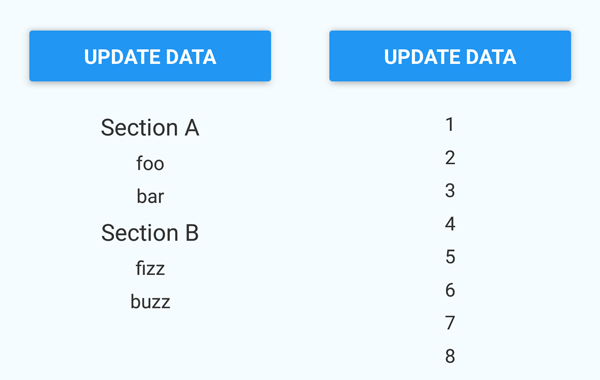cooperka / React Native Immutable List View
Programming Languages
Projects that are alternatives of or similar to React Native Immutable List View
React Native Immutable ListView
Drop-in replacement for React Native's ListView,
FlatList,
and VirtualizedList.
It supports Immutable.js to give you faster performance and less headaches.
Motivation
- Do you use Immutable data, only to write the same boilerplate over and over in order to display it?
- Do you want to show 'Loading...', 'No results', and 'Error!' states in your lists?
- Do you have nested objects in your state so a shallow diff won't cut it for pure rendering?
- Do you want better performance while animating screen transitions?
If you answered yes to ANY of these questions, this project can help. Check out the examples below.
How it works
For FlatList and VirtualizedList:
<ImmutableVirtualizedList
immutableData={this.state.listData}
renderItem={this.renderItem}
/>
For ListView (deprecated as of React Native v0.59):
<ImmutableListView
immutableData={this.state.listData}
renderRow={this.renderRow}
/>
The screenshot above shows two different lists. The first uses this data:
Immutable.fromJS({
'Section A': [
'foo',
'bar',
],
'Section B': [
'fizz',
'buzz',
],
})
The second list is even simpler:
Immutable.Range(1, 100)
There's an example app here if you'd like to see it in action.
Installation
-
Install:
-
Import it in your JS:
For FlatList and VirtualizedList:
import { ImmutableVirtualizedList } from 'react-native-immutable-list-view';
For ListView:
import { ImmutableListView } from 'react-native-immutable-list-view/lib/ImmutableListView';
Example usage -- replacing FlatList
Goodbye, keyExtractor boilerplate!
Note: This example diff looks much better on GitHub than on npm's site. Red means delete, green means add.
-import { Text, View, FlatList } from 'react-native';
+import { Text, View } from 'react-native';
+import { ImmutableVirtualizedList } from 'react-native-immutable-list-view';
import style from './styles';
import listData from './listData';
class App extends Component {
renderItem({ item, index }) {
return <Text style={style.row}>{item}</Text>;
}
render() {
return (
<View style={style.container}>
<Text style={style.welcome}>
Welcome to React Native!
</Text>
- <FlatList
- data={listData}
- getItem={(items, index) => items.get(index)}
- getItemCount={(items) => items.size}
- keyExtractor={(item, index) => String(index)}
+ <ImmutableVirtualizedList
+ immutableData={listData}
renderItem={this.renderItem}
/>
</View>
);
}
}
Example usage -- replacing ListView
You can remove all that boilerplate in your constructor, as well as lifecycle methods like
componentWillReceiveProps if all they're doing is updating your dataSource.
ImmutableListView will handle all of this for you.
Note: This example diff looks much better on GitHub than on npm's site. Red means delete, green means add.
-import { Text, View, ListView } from 'react-native';
+import { Text, View } from 'react-native';
+import { ImmutableListView } from 'react-native-immutable-list-view/lib/ImmutableListView';
import style from './styles';
import listData from './listData';
class App extends Component {
- constructor(props) {
- super(props);
-
- const dataSource = new ListView.DataSource({
- rowHasChanged: (r1, r2) => r1 !== r2,
- sectionHeaderHasChanged: (s1, s2) => s1 !== s2,
- });
-
- const mutableData = listData.toJS();
-
- this.state = {
- dataSource: dataSource.cloneWithRowsAndSections(mutableData),
- };
- }
-
- componentWillReceiveProps(newProps) {
- this.setState({
- dataSource: this.state.dataSource.cloneWithRows(newProps.listData),
- });
- }
-
renderRow(rowData) {
return <Text style={style.row}>{rowData}</Text>;
}
renderSectionHeader(sectionData, category) {
return <Text style={style.header}>{category}</Text>;
}
render() {
return (
<View style={style.container}>
<Text style={style.welcome}>
Welcome to React Native!
</Text>
- <ListView
- dataSource={this.state.dataSource}
+ <ImmutableListView
+ immutableData={listData}
renderRow={this.renderRow}
renderSectionHeader={this.renderSectionHeader}
/>
</View>
);
}
}
Customization
All the props supported by React Native's underlying List are simply passed through, and should work exactly the same. You can see all the VirtualizedList props or ListView props on React Native's website.
You can customize the look of your list by implementing renderItem for FlatList and VirtualizedList
or renderRow for ListView.
Here are the additional props that ImmutableVirtualizedList and ImmutableListView accept:
| Prop name | Data type | Default value? | Description |
|---|---|---|---|
immutableData |
Any Immutable.Iterable
|
Required. | The data to render. See below for some examples. |
rowsDuringInteraction |
number |
undefined |
How many rows of data to initially display while waiting for interactions to finish (e.g. Navigation animations). |
sectionHeaderHasChanged |
func |
(prevSectionData, nextSectionData) => false |
Only needed if your section header is dependent on your row data (uncommon; see ListViewDataSource's constructor for details). |
renderEmpty |
string or func
|
undefined |
If your data is empty (e.g. null, [], {}) and this prop is defined, then this will be rendered instead. Pull-refresh and scrolling functionality will be lost. Most of the time you should use renderEmptyInList instead. |
renderEmptyInList |
string or func
|
'No data.' |
If your data is empty (e.g. null, [], {}) and this prop is defined, then this will be rendered instead. Pull-refresh and scrolling functionality will be kept! See below for more details. |
Also see React Native's FlatListExample
for more inspiration.
Methods
Methods such as scrollToEnd are passed through just like the props described above.
You can read about them here for ListView
or here for FlatList and VirtualizedList.
The references to the raw VirtualizedList or ListView component are available via getVirtualizedList() or getListView().
These references allow you to access any other methods on the underlying List that you might need.
How to format your data
ImmutableListView accepts several standard formats
for list data. Here are some examples:
List
[rowData1, rowData2, ...]
Map of Lists
{
section1: [
rowData1,
rowData2,
...
],
...
}
Map of Maps
{
section1: {
rowId1: rowData1,
rowId2: rowData2,
...
},
...
}
To try it out yourself, you can use the example app!
Support is coming soon for section headers with ImmutableVirtualizedList too, similar to SectionList.
See PR #34.
Loading / Empty / Error states
The optional renderEmptyInList prop takes a string and renders an Immutable List displaying the text you specified.
By default, this text is simply No data., but you can customize this based on your state. For example:
render() {
const emptyText = this.state.isLoading
? "Loading..."
: this.state.errorMsg
? "Error!"
: "No data.";
return (
<ImmutableVirtualizedList
immutableData={this.state.listData}
renderItem={this.renderItem}
renderEmptyInList={emptyText}
/>
);
}
The empty list will receive all the same props as your normal list, so things like pull-to-refresh will still work.





